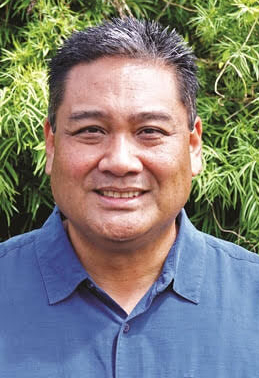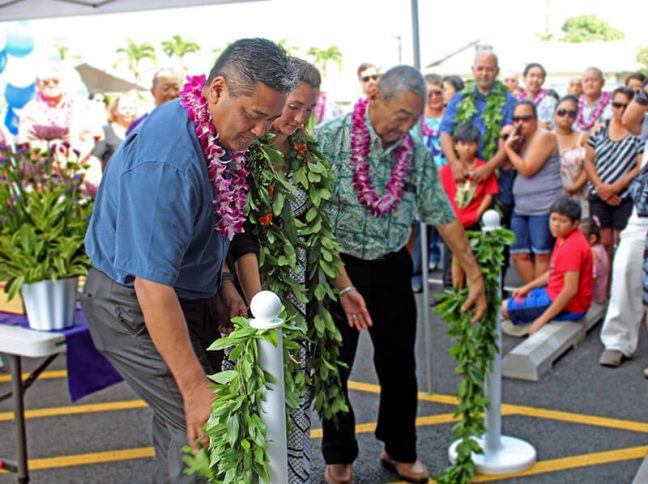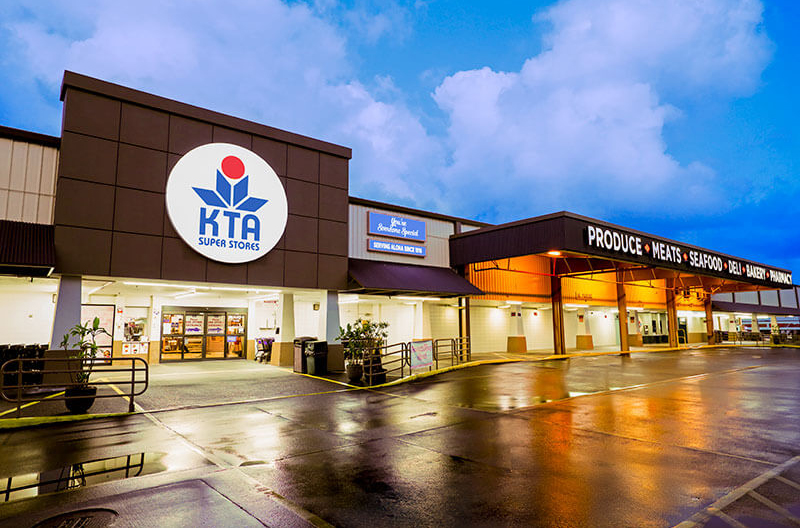Toby Taniguchi is the yonsei of his family’s company on the Big Island of Hawai’i. That is, he is the fourth generation to lead the business, Puna Plantation Hawaii Ltd., based in Hilo.
The company comprises businesses including six KTA Super Stores, KTA Express, five KTA Pharmacy locations and K. Takata Store, which Puna Plantation acquired in September.
Puna Plantation’s origins stretch back more than 100 years to 1916, when Toby’s great-grandfather, Koichi Taniguchi, opened a 500-square-foot grocery and dry goods store, K. Taniguchi Shoten, in Waiakea Town.

In each subsequent generation, the eldest son has taken the helm. Toby Taniguchi has served as president of Puna Plantation for 10 years and now also serves as CEO.
“In an Asian family, the eldest gets charged with a lot of stuff. That’s how I tell people I got my job, because it’s certainly not my smarts or anything,” quips Taniguchi, who is of Japanese and Filipino heritage.
His great-grandfather was born in Hatsukaichi, Japan, in the prefecture of Hiroshima. In the early 1900s, Koichi got on a ship with plans of going to California, leaving wife Taniyo behind until he could get settled. But he got off the ship on Oahu to visit a cousin in Honolulu, and immigration controls prevented him from going any farther.
He studied bookkeeping in Hilo and went to work for a wholesaler. He sent for Taniyo to join him, and in early 1916, with their first son due soon, they opened the store. Their son, Yukiwo, later known affectionately as “Mr. Y,” would go on to become father to Barry Taniguchi, Toby’s late father.
Through the generations, as the company has grown, the family’s commitment to supporting its communities has only gotten stronger.
“There’s a Japanese saying, okage sama de, which literally translates into, ‘I am what I am because of you.’ Our company takes that very seriously. We are what we are because of our community, and because of that we thank and honor our community,” Taniguchi said.
Reflect company’s heart
Taniguchi was quick to point out that the company’s team members share in the corporate heart of serving others.
“We have a lot of associates who give of themselves and of their time to the local community, and I am particularly proud of that. It’s more than just lip service; they show up, they volunteer their time, talents and treasure to various organizations, and they often do that unrecognized by others,” he said.
They support the efforts of The American Cancer Society, The Food Basket (Hawaii Island’s food bank) and Mental Health Kokua (a behavioral health agency), among others.
“It just humbles me to know that they give so much of themselves outside of work,” he said.
Taniguchi also commended the community service of KTA’s pharmacy team led by its director, Megan Arbles.
Beyond meeting health needs through the pharmacies, Arbles and her team offer a unique service – they go outside the stores to places like businesses, respite homes and elderly residences to administer vaccines for illnesses such as the flu and COVID. This service is especially invaluable for elderly people who may have difficulty traveling.
Arbles has received recognition from the state and various agencies for her team’s efforts.
Time to come home
Taniguchi was not a shoo-in to join the family business. He says he had a chip on his shoulder as a teenager, realizing there would be added pressures working there: “You’ve got to put in 110 percent; all eyes are on you. You’ve got to be the first one to get there and the last to leave.”
So he worked at a restaurant instead. He started as a busboy, worked up to waiting tables and then worked a few months behind the bar as a bar-back before going to the University of Portland in Oregon.
He worked in the grocery business at Fred Meyer for a short season after graduating from college in 1994, then worked in construction. After a breakup with a girlfriend, Taniguchi wrote to his dad, Barry, and asked if there might be a position for him at KTA. His dad’s response was immediate: “Of course.”

So, he returned home in the late ’90s. His dad required him to take on nearly every role in the store. He bagged groceries, wrote orders, stocked shelves, cashiered, cut fish and more.
“Looking back, I’m really glad he made me do that,” Taniguchi said. “It gave me a deeper understanding and empathy for what it takes to get the job done.”
Those roles also helped his product knowledge. In addition to traditional grocery items, KTA Super Stores carry a range of ethnic foods from places such as Japan, the Philippines, Korea and China.
After working his way up through those various positions, he ended up managing a KTA store in Waikoloa. Next was an area operations manager role, followed by VP for store operations. In 2014, the company’s board elected him president.
He said he’s had a lot of mentors along the way and continues to learn from peers, both those more seasoned and younger colleagues, particularly appreciating the latter’s tech-savviness.
Nimble and progressive
KTA Super Stores has been a pioneer in several areas over its history. Back in 1956, a renovation to the downtown Hilo store led to the island’s first self-service meat department.
In 1977, the Puainako store renovation yielded the first in-store bakery in the state. In ’79, it was the first supermarket in the state to fully install UPC barcode scanners at all checkouts (his late uncle Lon Taniguchi had an affinity for and “bled IBM”).
The first full-scale deli department on the Big Island opened at the Keauhou, Kona, store in 1984. KTA was first to have in-store bank branches (it still has one in operation today), and it also was the first grocer to commission large-scale photovoltaic systems to generate electricity. PV systems were installed at two stores in 2007 and two in 2013.
Being an independent grocer allows KTA to make decisions quickly without having to go through a lengthy approval process.
“I think we have a curiosity for trying new things and experimenting,” he said. “Whether it’s something to do with technology, a promotional activity, new business partnerships or providing new services and products, we like to explore, question and experiment.
“This innovative spirit,” he added, “likely comes from my great-grandfather, the entrepreneur who founded our business and worked diligently to nurture and grow it over many years.”
The Japanese call it gambare – “Do your best, keep going, never give up!”
That spirit was on display during the COVID pandemic as well. When restaurants on the island closed, EVP Derek Kurisu came up with the idea of doing pop-up eateries inside the stores, which remained open as “essential” businesses.
The restaurants were afforded space in chilled cases, on tables or in warmers to sell their specialties. For example, Nori’s Restaurant is known for fried saimin (ramen) noodles, barbecue sticks, assorted patties and saba (fish) recipes, “so they’d often package and sell those items in the display cases,” Taniguchi said.
Testumen sold curry plates, roasted sweet potato, musubi (rice balls) and sometimes unagi (eel) bowls, he said. Oshiro Tofu would sell ocean somen (noodle) salads and other items.
KTA ran the transactions through its POS systems and then compensated the restaurants for their sales.
[RELATED: Beauty, Challenges Are Dual Realities In Isolated, Expensive Hawaii]
Keeping it fresh
KTA is known for supporting local food producers, including farmers, ranchers and fishermen. About 95 percent of the leafy greens sold in its stores are grown on the island, and it is the only grocer in Hawaii to be able to offer local milk across its locations from the state’s last remaining dairy, located on the Big Island.
The rBST-free milk is sold under KTA’s proprietary brand, Mountain Apple. The lead developer of the brand was Kurisu back in 1994, when the demise of the sugarcane industry was nigh.
Taniguchi’s great-uncle, Tony Taniguchi, recognized that the end of the sugarcane industry would leave hundreds of plantation workers unemployed. He challenged Kurisu to come up with ideas to create new career opportunities for them.
He responded by creating the Mountain Apple brand. Those who had formerly grown sugarcane would instead grow crops like tomatoes, strawberries and lettuce, which would be sold at KTA stores.
KTA supported these entrepreneurs with startup costs, marketing, product labeling, etc., to help them rebuild their livelihoods. Taniguchi explained that a mountain apple – a type of rose apple – was one of the first fruits brought to Hawaii that “helped sustain the people here.”
The Mountain Apple brand has been a mix of successes and challenges but has endured for decades. It continues to grow, featuring products that are grown, manufactured or value-added in Hawaii. The brand includes fresh produce as well as packaged foods like nuts, coffee, tea, cookies and chips.
In addition to Mountain Apple, KTA introduced a newer private brand, “1916,” to commemorate the year the company was founded. These products are sourced from around the world, but KTA ensures they remain affordable for customers.
Taking care of stores, communities
KTA operates stores ranging from about 8,500 square feet to 35,000 square feet. Some are older but remain clean and well maintained. The company’s original store in downtown Hilo, for example, doesn’t have central air conditioning but benefits from several open perishable cases keeping the small space relatively comfortable.
Other stores are more contemporary, such as a Hilo location. It recently was refreshed with a neutral color scheme, natural wood elements and energy-efficient LED lighting. The lights were lowered from the high ceilings to create a warmer, cozier atmosphere.
The company is in a continuous cycle of refreshes, preferring to fund the projects out of operating cash rather than taking on debt.
In September 2024, KTA’s parent company added to its holdings with the acquisition of K. Takata Store. The retiring owners’ children chose not to take over, so brothers Rayton and Jerry Takata, who were friends of the Taniguchis, decided to sell.
“We’re honored to have the opportunity to continue their legacy. They’ve been a pillar for the North Kohala community for over 100 years. Having shared freight service over the years, it was a natural progression,” Taniguchi explained.
Feeding the island
In closing, Taniguchi reiterated KTA’s DNA.
“We take our responsibility to help feed the community very seriously. Being part of the community – that’s our DNA. Our community supports us, and we support them. It’s not a transaction; we want to build relationships and earn their trust every day.
“Hawaii is a small place, right? We live on an island, so I’m going to see you [around]. We’ve got to be able to all get together and work together collectively.
“We appreciate our customers, our business partners and, most of all, we’re grateful for our over 800 associates who choose to work with us.”

